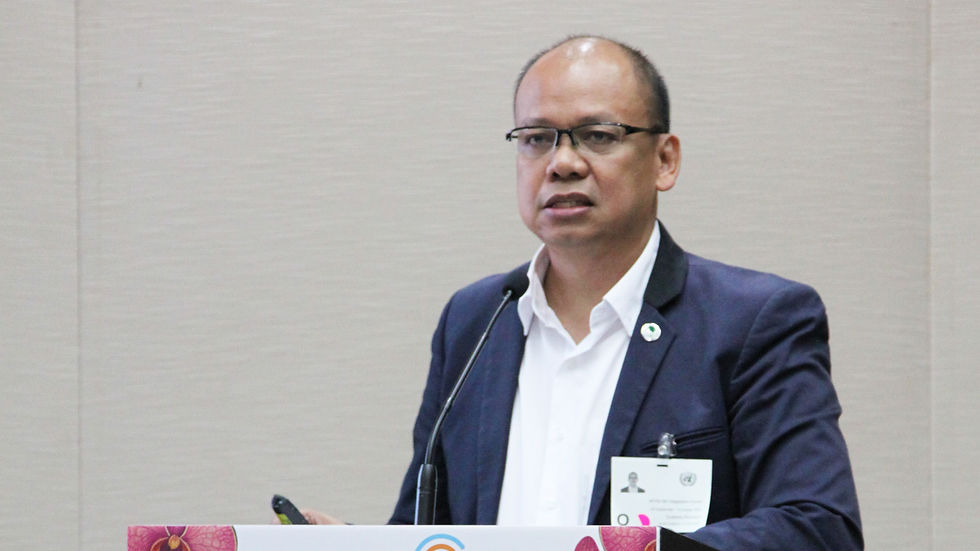Asia-Pacific stakeholders reflect on tools for the Making Cities Resilient 2030 initiative.
- Mar 3, 2023
- 3 min read
Updated: Feb 12, 2025

AIT RRC.AP hosted a Webinar titled Making Cities Resilient 2030 (MCR2030): Capacity Building Models and Tools to Strengthen Cities' Resilience in Asia and the Pacific on 23 February 2023. The event was organised in collaboration with the United Nations Office for Disaster Risk Reduction (UNDRR), the United Nations Development Programme (UNDP), the International Federation of Red Cross and Red Crescent Societies (IFRC), the Local Governments for Sustainability (ICLEI), the United Cities and Local Governments (UCLG) and the Asian Disaster Preparedness Center (ADPC). Over 160 online participants joined the live session.
Dr. Guilberto Borongan, Director of AIT RRC.AP, welcomed all the participants and thanked partner organisations. He shared that the MCR2030 initiative provides a roadmap for cities to commit to building resilience to climate and disaster risks, and is comprised of three stages which includes, (i) improving cities’ understanding of risks and committing to reduce; (ii) strengthening cities’ capacity to develop local risk reduction strategies and plans; and (iii) supporting implementation. He stressed the importance of an integrated approach to building resilience to both climate change and disaster risks which can benefit from cities’ ability to leverage existing efforts. He emphasized some key factors which could be beneficial to achieving the MCR2030 goals, including, (i) vertical integration between national and local governments; (ii) private sector involvement; (iii) cities’ access to different resources and partners; (iv) access to finance; (v) strong policy support and political commitment; and (vi) capacity-building, awareness raising and effective information sharing and advocacies. He highlighted that the ultimate goal of MCR2030 is for cities to be inclusive, safe, resilient and sustainable for all by 2030.
Ms. Sunisa Soodrak, MCR focal point for the Asia-Pacific region and Associate Programme Management Officer of the Regional Office for Asia and the Pacific, United Nations Office for Disaster Risk Reduction (UNDRR) mentioned that disasters are most often acutely felt at the cities and municipalities, noting that poor urban planning can lead to the creation of new risks in the context of widespread poverty & inequality. She highlighted that MCR2030 initiative has been established to support local governments and encouraged all municipalities to join the initiative. She outlined three simple stages to guide and support cities move along their resilience roadmap: understanding the risks, planning against them, and implementing measures to address them. She highlighted that at the heart of MCR is the cooperation, the intention to create an opportunity to share initiatives tailored to local needs and across all stakeholders. She pointed to the 21 resilience hubs around the world which are local authorities with established track records in disaster risk reduction and resilience who committed to support and mentor other MCR2030 cities. Two of these cities are in the Asia-Pacific region: Incheon (South Korea) and Makati (Philippines).
Ms. Yuko Yoshida, Deputy Director, Climate Change Adaptation Office, Global Environment Bureau, Ministry of the Environment, Japan (MOEJ) stressed that local governments are at the forefront of disaster response and are key actors across the risk management cycle. Building resilient cities means taking proactive action which includes learning how to be both flexible and agile to prepare, respond, and recover from disasters. She shared five needs and strategic priorities for urban resilience building: (i) giving more focus to cities in neglected geographies with greatest capacity gaps; (ii) strengthening urban governance by connecting national and municipal policies and implementation plans, and stepping up engagement with key interest groups to ensure collective action; (iii) ensuring that urban development and services address the specific needs and vulnerabilities of marginalized groups in urban communities; (iv) an MCR2030 global initiative with partners working together to augment the capacities in less-resourced cities to manage multidimensional risks through well-financed, risk-informed urban development planning and investments; and (v) more innovation for a future of resilient cities. She highlighted that climate change adaptive and disaster risk resilience-building measures are crucial in our region, and that country-level and city-level decision makers need to focus energies collectively and embrace innovation.
The webinar convened presentations from members of the MCR 2030 Regional Coordinating Committee for Asia and the Pacific:
Ms. Sunisa Soodrak and Ms. Silvi Llosa of the United Nations Office for Disaster Risk Reduction (UNDRR) Regional Office for Asia and the Pacific: “MCR2030 and Resilience Building at the Local Level”;
Ms. Antonette Anaban of the Disaster Risk Reduction and Management Office (CDRRMO) of the City Government of Baguio, Philippines: “Baguio City’s Actions/Updates on its Disaster Resilience Scorecard“;
Ms. Bedoshruti Sadhukhan of the Sustainability Management team in ICLEI South Asia: “Tools to support inclusive resilience planning for local governments”;
Mr. Helmi Abidin of the United Cities and Local Governments Asia-Pacific (UCLG ASPAC): “Building resilience at the local level (UCLG Learning module)”;
Ms. Cecilia Schmölzerof the International Federation of Red Cross and Red Crescent Societies “Building coalitions and leveraging community capacity to build urban resilience”, and;
Mr. Chinthaka Ganepola of the Asian Disaster Preparedness Center (ADPC): "Building urban resilience to climate extremes.”
A recording of the Webinar can be found here.


